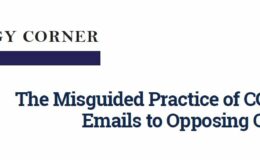After the flood of attention which lawyers and the media have recently paid to social networking sites, the next logical emphasis will be the ethical use, and mis-use, of such sites by lawyers.
Trying to jump start that inquiry, in Internet Social Networking Sites For Lawyers, we hinted at the risks of Facebook-friend’ing prospective jury members (improper contact under Rule 4-3.5) and we raised concerns about the use of social networking sites being deemed as advertising violations (Rules 4-7 and 4-15). Indeed, in a recent presentation, we even discussed whether a law firm could revise and tailor its website prior to trial. We also proposed to a paralegal group that they could not anonymously send Facebook-friend requests to jury members.
But we were clearly not thorough nor quick enough. The Philadelphia Bar Association Professional Guidance Committee hustled out its Opinion 2009-02 which held that a lawyer could not ask a “third person” (presumably a paralegal or office employee) to Facebook-friend a deposition witness so the lawyer could surreptitiously access the witness’ Facebook page.
For the uninitiated, the default setting on a person’s Facebook page is that only invited/permitted users can see the page. To gain access, a user needs to send a “Facebook friend request.” That request usually is accomplished by clicking a button which says “send Friend request.” There is a discreet link which says “Send a Personal Message” where the pursuing user can enter a greeting or identification or some kind but, at least anecdotally, this is rarely used. The receiving user can see the name, picture, and a brief description of the person sending the friend request. That person can then “confirm” or “ignore” the request. For a good summary of this process, look here.
Here, the lawyer believed the deponent had information on her web page and somehow believed she would accept just about anyone as a Facebook friend (presumably there was some discussion as to the number of Facebook friends or her Facebook practices). In person, the lawyer did not ask to be a Facebook-friend. Instead, the question was raised whether the lawyer could properly have a third person send the request — a person who the witness would likely not be able to identify as someone associated with the lawyer. The obvious intention was that the Facebook-promiscuous user would blindly accept the friend request, thereby giving the lawyer access to the page.
The Philly Bar concluded that this was improperly deceptive under their Rule 8.4, which is nearly word-for-word identical to Florida Rule Regulating the Florida Bar 4-8.4.
First, the lawyer was responsible for the acts of the third person since the lawyer was asking for and ratifying the conduct. Second, the lawyer was purportedly “engag[ing] in conduct involving dishonesty, fraud, deceit or misrepresentation… because the planned communication by the third party with the witness is deceptive [because] it omits a highly material fact, namely, that the third party who asks to be allowed access to the witness’ pages is doing so only because he or she is intent… on sharing it with the lawyer for use in a lawsuit to impeach the testimony of the witness.”
Unlike that Bar, we note that Facebook friend request typically do not involve an explanation / introduction and question whether this is truly “hiding” information. Then again, in a non-virtual world example, a lawyer asking another person to cozy up to a witness at a bar to get information seems improper. Your thoughts? Comments welcome below.


